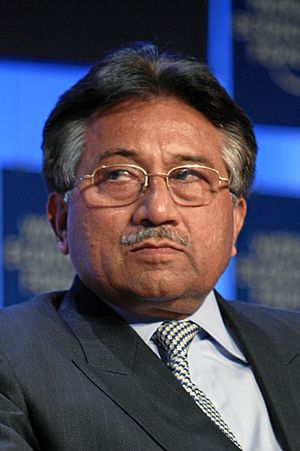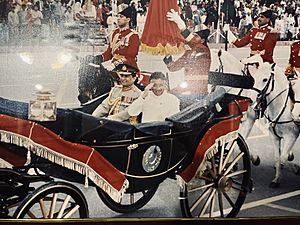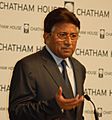Pervez Musharraf facts for kids
Quick facts for kids
General
Pervez Musharraf
NI(M) HI(M) TBt
|
|
|---|---|
|
پرویز مشرف
|
|

Musharraf in 2008
|
|
| 10th President of Pakistan | |
| In office 20 June 2001 – 18 August 2008 |
|
| Prime Minister |
See list
Zafarullah Khan Jamali
Shujaat Hussain Shaukat Aziz Muhammad Mian Soomro (caretaker) Yusuf Raza Gilani |
| Preceded by | Muhammad Rafiq Tarar |
| Succeeded by | Muhammad Mian Soomro (acting) |
| Chief Executive of Pakistan | |
| In office 12 October 1999 – 21 November 2002 |
|
| President | Muhammad Rafiq Tarar |
| Preceded by | Nawaz Sharif (Prime Minister) |
| Succeeded by | Zafarullah Khan Jamali (Prime Minister) |
| Minister of Defence | |
| In office 12 October 1999 – 23 October 2002 |
|
| Preceded by | Nawaz Sharif |
| Succeeded by | Rao Sikandar Iqbal |
| 10th Chairman Joint Chiefs of Staff Committee | |
| In office 8 October 1998 – 7 October 2001 |
|
| Preceded by | Jehangir Karamat |
| Succeeded by | Aziz Khan |
| 7th Chief of Army Staff | |
| In office 6 October 1998 – 29 November 2007 |
|
| President |
|
| Prime Minister |
See list
Nawaz Sharif
Zafarullah Khan Jamali Shaukat Aziz Muhammad Mian Soomro (caretaker) |
| Preceded by | Jehangir Karamat |
| Succeeded by | Ashfaq Parvez Kayani |
| Personal details | |
| Born |
Syed Pervez Musharraf
11 August 1943 Delhi, British India |
| Died | 5 February 2023 (aged 79) Dubai, United Arab Emirates |
| Resting place | Army Graveyard, Karachi, Pakistan |
| Citizenship |
|
| Political party | All Pakistan Muslim League |
| Other political affiliations |
Pakistan Muslim League (Q) |
| Spouse |
Sehba
(m. 1968) |
| Children | 2 |
| Alma mater |
|
| Awards |
|
| Military service | |
| Branch/service | Pakistan Army |
| Years of service | 1964–2007 |
| Rank | General |
| Unit | Regiment of Artillery |
| Commands |
|
| Battles/wars |
|
Pervez Musharraf (11 August 1943 – 5 February 2023) was a Pakistani military officer and politician. He served as the tenth president of Pakistan from 2001 to 2008. He was also the head of the Joint Chiefs of Staff Committee from 1998 to 2001. Before that, he was the Chief of the Army from 1998 to 2007.
Contents
Early Life
Growing Up in British India
Pervez Musharraf was born on 11 August 1943 in Delhi, which was then part of British India. His family spoke Urdu and were Muslims. They were also Sayyids, meaning they believed they were related to the Islamic prophet Muhammad.
His father, Syed Musharrafuddin, worked in the civil service, which was a very respected job during British rule. His mother, Begum Zarin Musharraf, studied English literature and focused on raising their family.
Pervez was the middle child of three boys. His older brother, Javed, became an economist. His younger brother, Naved, became a doctor in the United States.
Moving to Pakistan and Turkey
When Musharraf was four years old, India became independent, and Pakistan was created for Muslims. His family moved to Pakistan in August 1947. His father then joined the Pakistan Civil Services and later worked for the Foreign Ministry.
In 1949, Musharraf's family moved to Ankara, Turkey, because his father was a diplomat there. Pervez learned to speak Turkish and enjoyed playing sports. In 1957, he returned to Pakistan. He went to Saint Patrick's School in Karachi and later attended Forman Christian College University in Lahore, where he studied mathematics and economics.
Military Career
Joining the Army
In 1961, at age 18, Musharraf joined the Pakistan Military Academy in Kakul. He became good friends with General Srilal Weerasooriya from Sri Lanka. This friendship helped build strong ties between Pakistan and Sri Lanka.
Musharraf also shared a room with PQ Mehdi (who joined the Air Force) and Abdul Aziz Mirza (who joined the Navy). All three later became high-ranking officers. They passed many tests together, including physical and psychological exams.
Rising Through the Ranks
In 1964, Musharraf graduated from the military academy. He became a second lieutenant in the artillery regiment and was sent to the border with India. By the 1980s, he was leading an artillery brigade.
In the 1990s, he was promoted to major general and led an infantry division. He also commanded the Special Services Group, which is a special forces unit. He was involved in the Afghan Civil War, supporting the Taliban.
In 1998, Prime Minister Nawaz Sharif made Musharraf the head of the armed forces. Musharraf then led the Kargil infiltration in 1999, which caused a war between India and Pakistan. After some disagreements, Prime Minister Sharif tried to remove Musharraf from his position. However, the army took control in 1999, and Musharraf became the leader of Pakistan.
Becoming President
Leading Pakistan
In 2001, Pervez Musharraf became the president of Pakistan. During his time as president, he brought back the country's constitution in 2002, but he made many changes to it. He appointed Zafarullah Jamali and later Shaukat Aziz as prime minister.
Musharraf played a big part in the American-led war on terror, directing policies against terrorism. He also encouraged economic growth in Pakistan.
Key Changes During His Time
During his presidency, Pakistan's economy grew significantly. Musharraf also allowed many private television channels to open, which changed the media in Pakistan. He personally supported television dramas, the film industry, theatre, and music. Rock music bands became very popular, and many concerts were held. These cultural changes often promoted the national spirit of Pakistan.
In 2007, Musharraf's position became weaker after he suspended the judges. He resigned in 2008 to avoid being removed from office and moved to London.
After Being President
After he resigned, Musharraf went on a holy trip to Mecca. He then traveled to the Middle East, Europe, and the United States to give speeches.
In 2013, Musharraf returned to Pakistan to take part in the general election. However, he was not allowed to run because of serious accusations against him. He faced charges related to suspending the constitution in 2007. In 2019, a special court gave him a serious sentence while he was away, but this was later changed by another court.
Personal Life
Pervez Musharraf was the second of three sons. His older brother, Javed, worked as a high-level official in Pakistan. His younger brother, Naved, is a doctor living in Chicago.
Musharraf married Sehba from Karachi on 28 December 1968. They had two children: a daughter named Ayla, who is an architect, and a son named Bilal.
His Passing
Pervez Musharraf passed away on 5 February 2023, at the age of 79. He had been ill with a disease called amyloidosis. His body was brought back to Karachi, Pakistan, from Dubai. His funeral prayers were held on 7 February, and he was buried with military honors in an army graveyard in Karachi.
See also
 In Spanish: Pervez Musharraf para niños
In Spanish: Pervez Musharraf para niños
Images for kids
-
Speaking at Chatham House in London in 2010
-
Pervez Musharraf speaking at the WEF
 | William L. Dawson |
 | W. E. B. Du Bois |
 | Harry Belafonte |







